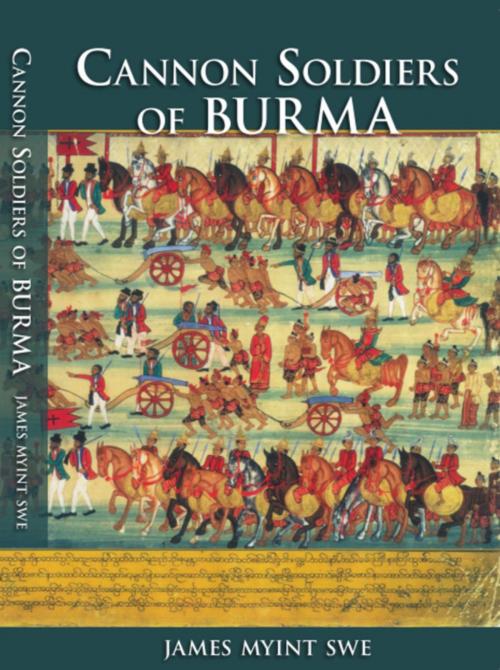Cannon Soldiers of Burma
A Part of Burmese History Largely Unknown to Its Modern Peoples & the World
Fiction & Literature, Historical| Author: | James Myint Swe | ISBN: | 9781483532424 |
| Publisher: | BookBaby | Publication: | July 5, 2014 |
| Imprint: | Language: | English |
| Author: | James Myint Swe |
| ISBN: | 9781483532424 |
| Publisher: | BookBaby |
| Publication: | July 5, 2014 |
| Imprint: | |
| Language: | English |
The early 16th century; a time of adventure and exploration when bold men dared to brave uncharted seas in search of exotic lands. One such group, a band of young Portuguese sailors seeking fame and fortune, arrived at Burma’s western shores for trade but found much more. Their ability to impress the Burmese Kings with their sophisticated cannons and muskets started a relationship that at first made them masters of their own fate but quickly evolved into their total enslavement. As years went by, the Portuguese began to get more involved in the internal affairs of the divided ethnic city states and the power struggles of the Burmese kings. Working as paid mercenaries, the Portuguese would fight on the side of any king who could pay more. This time of greatness came to an end as one audacious mercenary, Phillipe de Brito, was given the governorship of Syriam port by a trusting Rakhine king, but his greed and deceptive ways soon angered the king. The king attacked Syriam but de Brito fought back and won the first round. Then another king attacked Syriam, this time de Brito was executed and the enraged king destroyed Syriam and killed all of de Brito’s family in Martaban. Amid the chaos de Brito’s beautiful widow Dona Luisa de Brito returns from Goa with a convoy of five Portuguese ships. All aboard were taken prisoner. Bold and defiant, Luisa emerges as a true leader, and promises her people that she will stand by them, no matter where their future will be. Bound by chains and yokes they are forced to march a torturous five hundred miles to Ava, the King’s seat of power. With very little food and mounting brutality, the hellish seventy five day journey begins. Suppressing her own grief, Dona Luisa endures unbelievable punishment to fight hunger, poverty and mistreatment of her fellow prisoners under the brutality of a crazed king. With only her deep faith and strong will to sustain her, she would eventually lead her people to freedom and a land of their own; the Land of the “Two Rivers Valley”. Far from Portugal and imprisoned within a strange land, the story of Luisa and the group of Portuguese prisoners deals with the isolation and sadness, survival amid hardships, deep in the middle of Burma. She was enslaved by one king but was granted freedom by another kind and generous king, as she makes Burma her permanent home. This book is a revelation about two hundred years of lost Burmese history and a past that is largely unknown by its modern peoples. It presents the sacrifices of the “Cannon Soldiers of Burma”, their contribution and influence towards Burmese society. It shows its characters’ perseverance and strength as they try to assimilate into Burmese culture while preserving their own beliefs and convictions. Finally, it serves to reconnect the author with the rich history of his ancestors as he presents his heritage as a true descendant of the Two Rivers Valley.
The early 16th century; a time of adventure and exploration when bold men dared to brave uncharted seas in search of exotic lands. One such group, a band of young Portuguese sailors seeking fame and fortune, arrived at Burma’s western shores for trade but found much more. Their ability to impress the Burmese Kings with their sophisticated cannons and muskets started a relationship that at first made them masters of their own fate but quickly evolved into their total enslavement. As years went by, the Portuguese began to get more involved in the internal affairs of the divided ethnic city states and the power struggles of the Burmese kings. Working as paid mercenaries, the Portuguese would fight on the side of any king who could pay more. This time of greatness came to an end as one audacious mercenary, Phillipe de Brito, was given the governorship of Syriam port by a trusting Rakhine king, but his greed and deceptive ways soon angered the king. The king attacked Syriam but de Brito fought back and won the first round. Then another king attacked Syriam, this time de Brito was executed and the enraged king destroyed Syriam and killed all of de Brito’s family in Martaban. Amid the chaos de Brito’s beautiful widow Dona Luisa de Brito returns from Goa with a convoy of five Portuguese ships. All aboard were taken prisoner. Bold and defiant, Luisa emerges as a true leader, and promises her people that she will stand by them, no matter where their future will be. Bound by chains and yokes they are forced to march a torturous five hundred miles to Ava, the King’s seat of power. With very little food and mounting brutality, the hellish seventy five day journey begins. Suppressing her own grief, Dona Luisa endures unbelievable punishment to fight hunger, poverty and mistreatment of her fellow prisoners under the brutality of a crazed king. With only her deep faith and strong will to sustain her, she would eventually lead her people to freedom and a land of their own; the Land of the “Two Rivers Valley”. Far from Portugal and imprisoned within a strange land, the story of Luisa and the group of Portuguese prisoners deals with the isolation and sadness, survival amid hardships, deep in the middle of Burma. She was enslaved by one king but was granted freedom by another kind and generous king, as she makes Burma her permanent home. This book is a revelation about two hundred years of lost Burmese history and a past that is largely unknown by its modern peoples. It presents the sacrifices of the “Cannon Soldiers of Burma”, their contribution and influence towards Burmese society. It shows its characters’ perseverance and strength as they try to assimilate into Burmese culture while preserving their own beliefs and convictions. Finally, it serves to reconnect the author with the rich history of his ancestors as he presents his heritage as a true descendant of the Two Rivers Valley.















